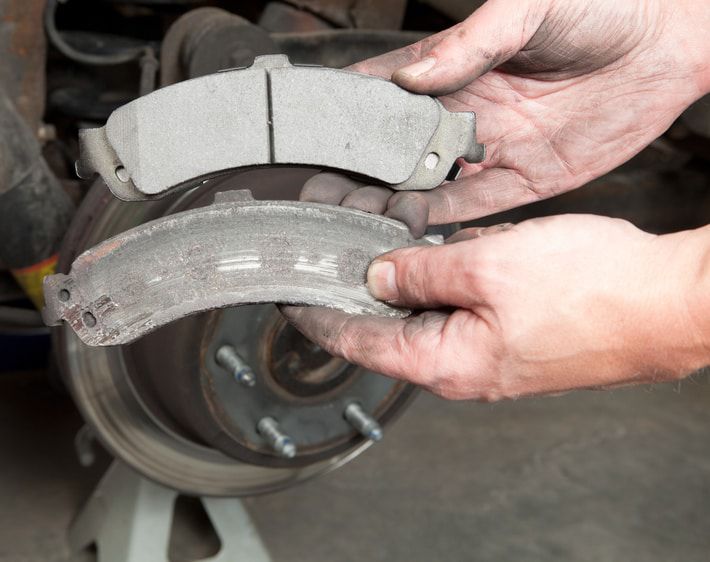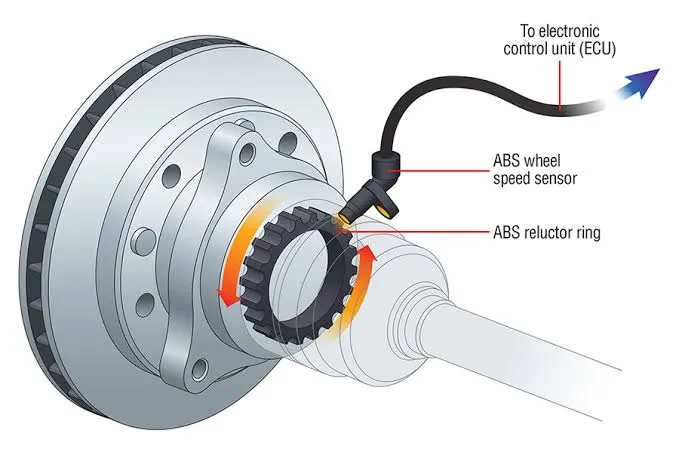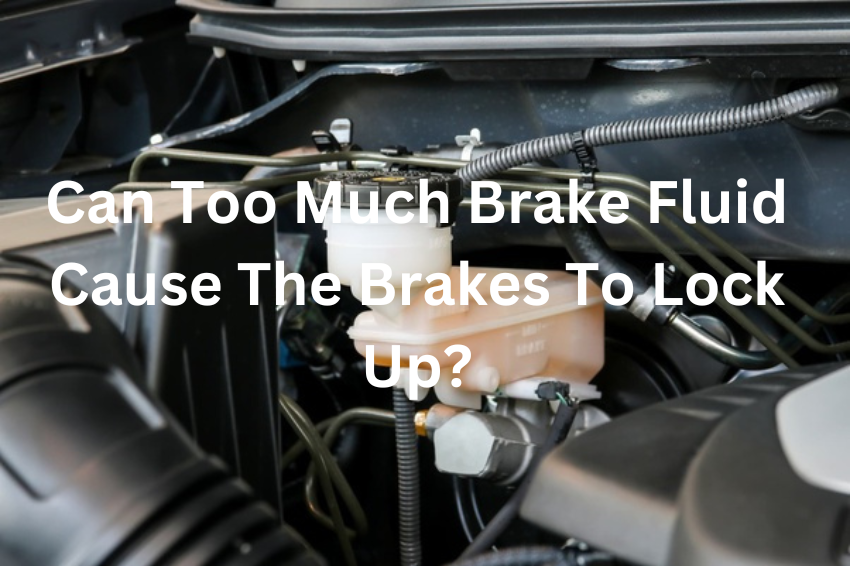“Excess brake fluid does not directly cause locked brakes”.
What Are The Causes Of Brake Lockup?
Here are some of the most common reasons brakes lock up:
Worn Brake Pads:
These are the parts that create friction to slow down your wheels.
Over time, they wear down and become thinner.
When this happens, more pressure is needed on the pedal to achieve the same stopping power.
In extreme cases, excessively worn pads might not retract fully from the rotors (discs), causing them to constantly rub and potentially lock the wheels, especially during hard braking.

Faulty Anti-lock Braking System (ABS):
Modern cars are equipped with ABS, a safety feature that helps prevent wheels from locking during hard braking.
A malfunctioning ABS can lead to the wheels locking up unexpectedly, even on dry surfaces.

Slippery Road Conditions:
Rain, ice, or snow can significantly reduce the grip between your tires and the road.
This can cause the wheels to lock up even with moderate brake pressure.
Be extra cautious and apply the brakes gently when driving on slippery surfaces.

Uneven Brake Pressure:
This can occur due to a malfunctioning brake caliper or a problem with the hydraulic system.
Uneven pressure can cause one or both wheels to lock up while the others continue to spin freely, making it difficult to control the vehicle.

Hydraulic Brake System Failure:
The hydraulic system transmits the force from your brake pedal to the wheels.
A leak or malfunction in this system can lead to a loss of brake pressure, making it harder to stop the car.
In some cases, complete brake failure can cause the wheels to lock up unexpectedly.
With that being said, If you experience brake lockup while driving, try to stay calm and do not slam on the brakes.
Instead, slowly release the pressure on the pedal and attempt to pump the brakes gently.
This may help regain some control of the vehicle.
If possible, steer towards a safe location and come to a complete stop.
Does Brake Fluid Level Affect Braking Power?
Yes, brake fluid level affects braking power.
Your car’s brake system relies on brake fluid, a special type of hydraulic fluid.
When you press the brake pedal, this fluid transmits the force to the brake calipers at each wheel.
Think of it like pushing on a long, fluid-filled tube, the pressure goes all the way to the brakes.
The calipers then squeeze the brake pads against the discs (rotors) on your wheels to create friction that slows down the car.
Now, if the brake fluid level is low, there’s not enough fluid to transmit the full force from your pedal.
This results in spongy or soft brakes.
You’ll have to press much harder on the pedal to get the same stopping power.
In severe cases, very low fluid can even cause a complete brake failure.
Symptoms Of A Bad Brake Master Cylinder
Here are some common warning signs to watch out for:
Spongy or soft brake pedal:
This is a common indicator of a failing master cylinder.
When you press the pedal, it feels mushy and goes down further than usual before engaging the brakes.
This is because the master cylinder isn’t generating enough pressure to properly push the brake fluid.

Uneven braking:
A faulty master cylinder might cause one side of your car to brake more forcefully than the other.
This can be dangerous and lead to loss of control during braking.
Increased stopping distance:
If it takes noticeably longer than usual to stop your car, it could be a sign of a failing master cylinder.
This is because the compromised pressure reduces the braking system’s effectiveness.
Leaking brake fluid:
The master cylinder can develop internal or external leaks.
If you notice puddles of brake fluid under your car, especially near the front wheels or firewall, it’s important to have your brakes checked by a mechanic immediately.
Brake fluid is essential for proper braking, and a leak can significantly impact braking performance.

Low brake fluid level:
While a drop in brake fluid level can have other causes like worn brake pads, it can also be a symptom of a master cylinder leak.
It’s important to have a qualified mechanic diagnose the cause of low fluid.

Good day! I know this is kinda off topic buut I’d figured I’d ask.
Would you be interested inn exchanging inks or maybe
gust authoring a blog post or vice-versa? My website addresses a lot of the same subjects as yours and I think we coul greatly benefit from each other.
If you happen to be interested feel free to shoot me an email.
I look forward to hearing from you! Great blog by the way! https://zeleniymis.Com.ua/
Good day, please send a greeting to my email, and your blog
Revivenridewithus@gmail.com